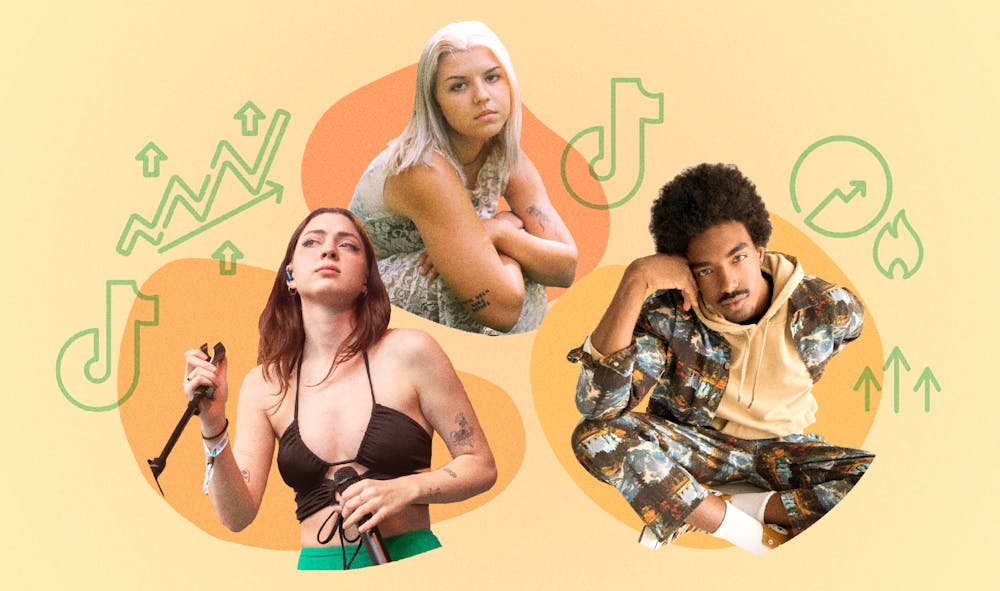TikTok is the powerhouse driving today's cultural trends. Artists of all kinds flock to the platform to kick–start their careers, and musicians are no exception. Indie musicians are eager to blow up on TikTok by posting short videos teasing lyrics and upcoming releases. However, success on the platform proves elusive for many, and those that attain it face troubles transforming TikTok views into a sustainable music career. After reaching their desired level of exposure, musicians on TikTok often struggle to separate their professional identity from the app.
Pop–rap artist Lil Nas X is the poster child for turning TikTok virality into a career. In 2019, his song “Old Town Road” made it from Twitter, to TikTok, to number one on the Billboard 100. Since the song’s release, Lil Nas X has become a popular mainstream artist, inspiring hope in indie musicians worldwide.
Many emerging indie musicians view TikTok as a critical part of their marketing strategies. The new generation of TikTok–based artists invest hours into creating online promotional content. The app's users familiarize themselves with new music through short snippets, then listen to the rest of the song on streaming platforms, being converted from casual listeners to fans in the process.
However, the path to professional success isn’t smooth—even after an artist creates their critical sensational video. In June of 2020, indie–folk artist Lizzy McAlpine went viral on TikTok when a clip of her singing about an ex who ruined The 1975 for her caught the eyes of millions. When McAlpine expressed that she wasn’t interested in releasing a full–length version of the track, her followers weren’t pleased. Despite the pushback, McAlpine still didn’t release the track, because she felt it didn’t reflect who she was as an artist. Nevertheless, McAlpine capitalized on her TikTok fame by growing an audience that loves her sound. She’s since released two albums, Give Me A Minute and five seconds flat, jam–packed with the songs of which she’s most proud. Nowadays, McAlpine begrudges the association with TikTok, telling WhyNow UK, “It hurts my heart a little bit when people say I started on TikTok.”
Eliza McLamb is another indie musician who thanks TikTok for establishing her music career. McLamb was a first–year student at the George Washington University when the COVID–19 pandemic sent her back to her hometown of Carrboro, N.C. It was then that McLamb turned to TikTok to promote her music. In 2020, McLamb took listener requests and turned them into songs; suddenly, one of these requests went viral. The TikTok video became her most–streamed track, “Porn Star Tits,” which is notably different in style from the rest of her discography. While McLamb expresses fondness for this song, she admits she wouldn’t have released it if not for the behest of her viewers. McLamb released her first EP Memos later that year and will be touring the West Coast with indie–rock bands Illuminati Hotties and Enumclaw this November.
Other musicians who have found success on TikTok are less motivated by the desire to create weighty music. Tiagz, born Tiago Garcia–Arenas, is an indie producer who found success creating music written for the TikTok algorithm, which he refers to as “meme music.” This approach led to the creation of songs behind some of the most viral Tik Tok trends, including “My Heart Went Oops” and “They Call me Tiago (Her Name Is Margo).” Tiagz’s meme music earned him a record deal with Epic Records. The producer respects the machine of TikTok and believes in time he’ll become “one of the biggest and most impactful entertainers in the universe.”
The downside to Tiagz’s approach is its terrible critical reception. A Pitchfork headline labeled Tiagz as a “cringey remixer,” then describing “They Call me Tiago (Her Name Is Margo)” as “rudderless and vacant.” But not every artist needs to be releasing poignant songs. Evidently, there’s a place for Tiagz’s style, albeit a polarizing one, in the current social media landscape.
TikTok can ease the daunting breakthrough into the music industry for many indie artists. The platform provides artists with a direct connection to potential listeners, but in doing so makes it difficult to stay authentic. Any time musicians spend creating content optimized to succeed within the TikTok algorithm is time taken away from creating music faithful to themselves. Additionally, if an artist blows up for a certain type of music, that’s the type of music listeners expect from them. A failure to deliver on these expectations can result in listeners losing interest.
TikTok's indie musicians must actively fight the pressure to alter their music to appeal to the masses. Katie Gregson–MacLeod is a musician who waged this internal battle when verses from her song “complex” went viral on the app, telling The New York Times, “When the chorus did so well, I swore to myself, I am not changing one word of the rest of the song.” Gregson–MacLeod is a Scottish singer–songwriter who gained recognition on TikTok for this hit she later released under the title “complex (demo),” but takes issue with the way users rewrite her lyrics in their own videos.
Aspiring indie musicians should heed the words of music marketing experts: Followers are not fans. Achieving virality isn’t a substitute for connecting with an audience. Creating long–term career success as a musician still requires nurturing relationships, and TikTok is just a jumping–off point.







